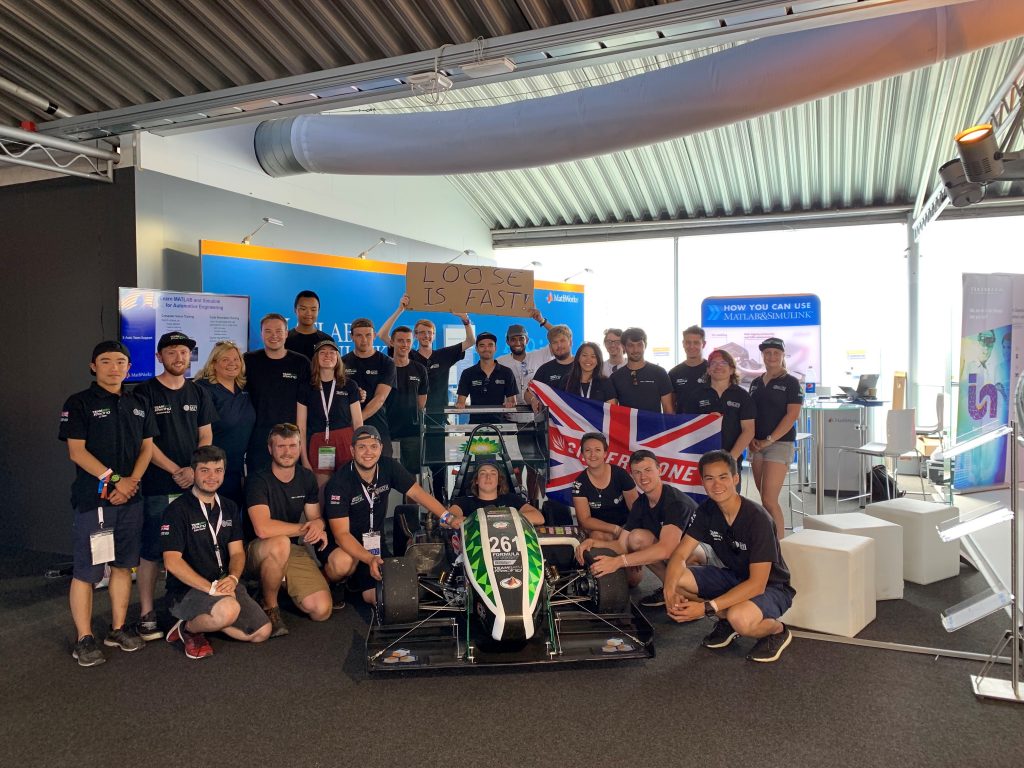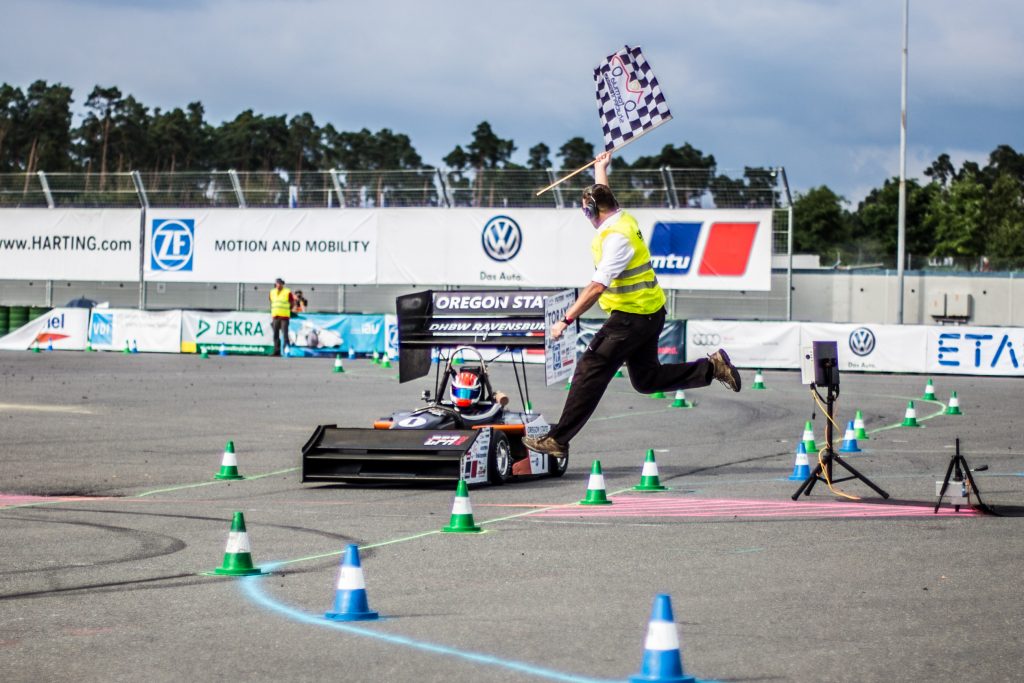Where Are They Now? – Karen Law, Meggitt PLC
Today we’re talking to Karen Law from Meggit PLC. We first met Karen when she was a student at the University of Bath studying Mechanical Engineering. Karen participated at Formula Student UK, Formula Student Germany, and Formula Student Austria and we’d often speak at the MathWorks booths. Now, Karen works for Meggitt PLC, where she uses MATLAB and Simulink on a daily basis. I bumped into Karen at one of our MATLAB EXPOs and this is what she had to say.
What Did You Learn in these Competitions?
Why did you choose to get involved in these competitions?
I chose to do engineering at university because I enjoyed learning about how things work and how things are made. The practical element was important to me so the idea of designing and building a physical race car was especially appealing to me. I got involved in Team Bath Racing as part of our third year Group Business Design Project and we competed in the FSUK Class 2 competition before returning the following year with our Class 1 entry which was all designed from scratch. We also got the chance to show off our car at FS Germany and FS Austria which was an exciting (yet stressful) experience! Formula Student allows you to work in a team, tackle proper engineering problems together and exposes you to the new emerging technologies from the automotive industry which can be implemented in our design. There’s a strong business element to the competition and it would not possible to build a race car without our sponsors. Formula Student provides a framework for us to collaborate with industrial sponsors, to develop or enhance technologies that benefit both the sponsor and the Formula Student team. Finally, I got involved because it sounded like a fun project! The competitions were a great opportunity to show off and celebrate our work and the work of the other formula student teams around the world!
What was your role on the team?
I was the Aerodynamics lead for Team Bath Racing. Having zero knowledge of the aerodynamics of cars or even where to begin designing aerodynamics, I questioned my life choices at the time. The pressure was even greater when all the other department leads had some sort of experience in automotive and F1! However, I was determined to fulfill my role, I took on the responsibility of simulating full car CFD and scale-model wind tunnel testing for validation as well as scheduling the manufacturing process of producing our entire aerodynamics package out of carbon fibre. In my free time, my business role in the team was to organize outreach events and attempt to manage the social media pages although I can’t take any of the credit of the memes throughout the competition!
Did you use MATLAB/Simulink in the development of your car?
MATLAB was used excessively by other members of the team in the powertrain and vehicle dynamics department and it proved very helpful during the design phase. If I’m honest, I didn’t use much MATLAB; not because it was difficult to use but because the thought of deciphering lines of code (which is usually what I associate MATLAB with) was very daunting. The extent of my MATLAB knowledge at university was for producing pretty graphs for reports (for which I still had to Google the functions for ‘plot’).
How Did the Competition Help You Find a Job?
It motivated me to learn new software that would help with the design of the car. I was able to apply some of the theories that I learnt in lectures and test them out on the car either physically, or through computer simulations.
Do you think the skills you gained using these tools has helped you in your professional career? If so, how?
One of the skills I learnt from being in Team Bath Racing was the ability to understand and learn to use a piece of software/tool quickly. This has been very beneficial in my career so far as the rotational aspect of my graduate program means I have to be able to pick up and use a software to a high level quickly. Luckily for me, the software my current rotation uses is MATLAB and Simulink, which I use on a daily basis.
Did your hands-on experience in the competition help to prepare you for your first role in industry?
Definitely. It’s one thing designing a car, it’s another to make one. Ensuring all the aerodynamic elements of the car could be manufactured was a challenge and not to mention, time consuming! Carbon lay-up is such a niche skill and one that I’m unlikely to use again in my career, but in my opinion, having an appreciation of how things are manufactured is so important as an engineer! One of my favorite things about being in a Formula Student team was the practical, hands-on element. It motivated me to learn new software that would help with the design of the car. I was able to apply some of the theories that I learnt in lectures and test them out on the car either physically, or through computer simulations. It also motivated me to learn to use new tools and machines to make physical parts for the car as there is nothing more motivating than a pressing deadline to launch the car in front of our sponsors!
What Are You Working On Today?
I now use Simulink all day, everyday! It’s much more intuitive to MATLAB code, and I’m able to visualize what I model which makes it less daunting.
In your current role at Meggitt do you use MATLAB/Simulink?
I’m currently on my first graduate rotation at Meggitt Avionics as a Systems engineer and I now use Simulink all day, everyday! It’s much more intuitive to MATLAB code, and I’m able to visualize what I model which makes it less daunting. I started the job with no prior experience of Simulink, but the skills that I learnt from being in fast pace formula student team allowed me to pick it up quite quickly. I still have to decipher MATLAB code in order to model it in Simulink, but thanks to the company coding standards, that’s made it easier to understand too.
What big project you are working on right now?
I’m currently focused on a Model-based Systems Engineering (MBSE) project. I’m looking at ways to incorporate model-based systems in our current system development process. To do this, I use Simulink as our modelling tool, and I investigate the useful Simulink toolboxes that MathWorks offer to help define this process. MBSE is becoming more and more prevalent in engineering and the ability to model, simulate, and test systems is becoming more popular in industry.
Key Takeaways
Having an appreciation of how things are manufactured is so important as an engineer!
What advice would you give young engineers seeking employment post-grad?
Firstly, do what you enjoy! Whether that’s a specific area of engineering, or you just enjoy learning or creating things. I’ve found that when I do what I enjoy, I’m more productive and generally feel more positive which can also benefit the environment around me.
Second, ask questions and be curious! I’ve been told you only use about 10% of your degree in your career (which 10% is unknown), the rest of your knowledge and expertise is developed from learning on the job and having the opportunity to put things into practice. So show your willingness to learn and develop by showing an interest in the company and asking questions.
Finally, something I took from being in Formula Student: don’t be afraid of failure. There were many wins, but also fails during my time with TBR, and it’s important to be able to reflect on them and see them as opportunities to grow and learn about yourself. Not to mention, a popular interview question is always to do with a time you overcame a challenge or were unable to achieve your goal, so even if it feels rubbish that you failed, at least you’ll have something to talk about!
Is there anything else that you would like to add?
Although designing and building a car from scratch in 18 months was kind of stressful at the time, I associate my time with Formula Student with many great memories and achievements. I would encourage everyone with the opportunity, to participate in the competition, as there’s so much to be gained from getting involved—from both a technical and non-technical perspective. Finally, I’d like to express my utmost appreciation to Team Bath Racing and all of our industrial sponsors for making it possible to compete and giving me the opportunity to develop myself as an engineer in preparation to work in industry.












评论
要发表评论,请点击 此处 登录到您的 MathWorks 帐户或创建一个新帐户。